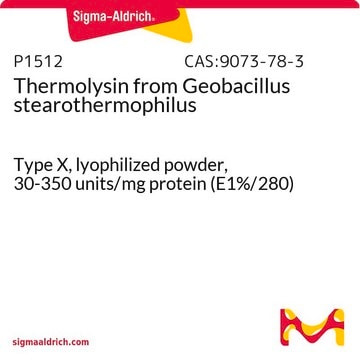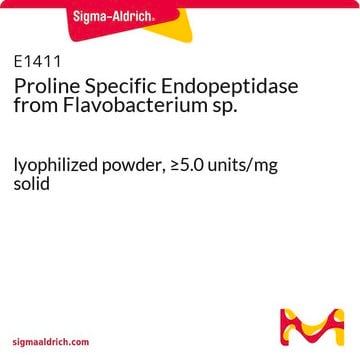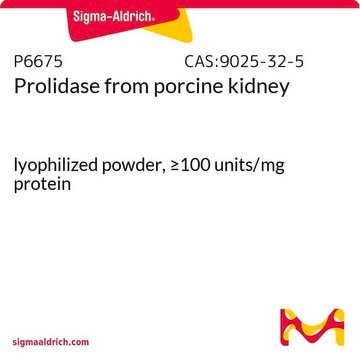A6362
Alpha-lytic protease
Synonym(s):
Alpha-lytic endopeptidase, alphaLP
Sign Into View Organizational & Contract Pricing
All Photos(1)
About This Item
Recommended Products
biological source
bacterial
Quality Level
form
liquid
specific activity
≥0.0005 U/mg
mol wt
19,860 Da
optimum pH
5.0(storage)
7.5(activity)
pI
9.69
shipped in
dry ice
storage temp.
−70°C
General description
Alpha-lytic protease (aLP) is an alternative specificity protease for proteomics applications. This protease cleaves after T, A, S, and V residues. It generates peptides of similar average length as trypsin.
aLP was first isolated from the myxobacterium Lysobacter enzymogenes. The pro-form of aLP is 397 amino acids long. In its mature form, aLP is 198 amino acids long. Its tertiary structural core resembles those of pancreatic serine proteases.
Crystal structure studies of aLP have been reported. Several studies are available on the active site and catalytic mechanism of aLP. The role of the pro-region in the activation, secretion and folding of aLP has been studied.
The activity of aLP in the presence of various solution components is as follows:
aLP was first isolated from the myxobacterium Lysobacter enzymogenes. The pro-form of aLP is 397 amino acids long. In its mature form, aLP is 198 amino acids long. Its tertiary structural core resembles those of pancreatic serine proteases.
Crystal structure studies of aLP have been reported. Several studies are available on the active site and catalytic mechanism of aLP. The role of the pro-region in the activation, secretion and folding of aLP has been studied.
The activity of aLP in the presence of various solution components is as follows:
- 0.1% sodium deoxycholate: ~1.75-fold enhanced activity
- 1.0% sodium deoxycholate: ~60% activity
- 0.1% SDS: ~50% activity
- 1.0% SDS: ~40% activity
- 1 M guanidine HCl: ~20% activity
- 4 M guanidine HCl: ~1% activity (essentially inactivated)
Unit Definition
One unit will produce one mmole of p-nitroaniline per minute from N-succinyl-Ala-Ala-Ala-PNA at 25 °C at pH 7.5
Physical form
Supplied as a solution in 10 mM sodium acetate buffer, pH 5.0.
Storage Class Code
12 - Non Combustible Liquids
WGK
WGK 1
Flash Point(F)
Not applicable
Flash Point(C)
Not applicable
Choose from one of the most recent versions:
Certificates of Analysis (COA)
Lot/Batch Number
Don't see the Right Version?
If you require a particular version, you can look up a specific certificate by the Lot or Batch number.
Already Own This Product?
Find documentation for the products that you have recently purchased in the Document Library.
Customers Also Viewed
Molecular structure of the alpha-lytic protease from Myxobacter 495 at 2.8 Angstroms resolution.
G D Brayer et al.
Journal of molecular biology, 131(4), 743-775 (1979-07-15)
Hangping Yao et al.
Cell, 183(3), 730-738 (2020-09-28)
SARS-CoV-2 is an enveloped virus responsible for the COVID-19 pandemic. Despite recent advances in the structural elucidation of SARS-CoV-2 proteins, the detailed architecture of the intact virus remains to be unveiled. Here we report the molecular assembly of the authentic
Site specific N- and O-glycosylation mapping of the spike proteins of SARS-CoV-2 variants of concern.
Shajahan, et al.
Scientific Reports, 13, 10053-10053 (2023)
M Fujinaga et al.
Journal of molecular biology, 184(3), 479-502 (1985-08-05)
The structure of alpha-lytic protease, a serine protease produced by the bacterium Lysobacter enzymogenes, has been refined at 1.7 A resolution. The conventional R-factor is 0.131 for the 14,996 reflections between 8 and 1.7 A resolution with I greater than
C A Bauer et al.
European journal of biochemistry, 120(2), 289-294 (1981-11-01)
The active site of alpha-lytic protease has been studied with a number of synthetic peptides and compared with similar data published for elastase. The kinetic data indicate that the active site of alpha-lytic protease extends over at least six subsites
Our team of scientists has experience in all areas of research including Life Science, Material Science, Chemical Synthesis, Chromatography, Analytical and many others.
Contact Technical Service













